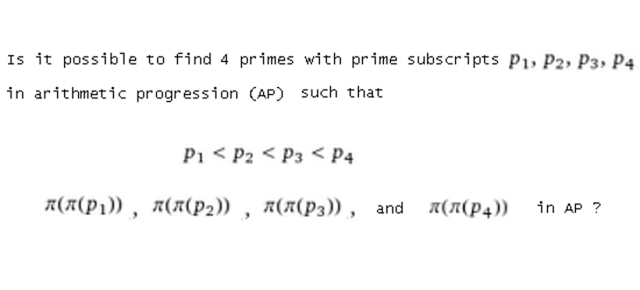Primes with prime subscripts
A006450
3, 5, 11, 17, 31, 41, 59, 67, 83, 109, 127, 157, 179, 191, 211, 241, 277, 283, 331, 353, 367, 401, 431, 461, 509, 547, 563, 587, 599, 617, 709, 739, 773, 797, 859, 877, 919, 967, 991, 1031, 1063, 1087, 1153, 1171, 1201, 1217, 1297, 1409, 1433, 1447, 1471, …
Derek found:
(158161, 158227, 158293, 158359)
(371131, 371941, 372751, 373561)



I think there must have been a slight error creep in somewhere, {20, 23, 25, 28} aren’t in AP. within the limits of my available RAM these are the AP PrimeSubscripts
{353,431,509,587}
{401,2081,3761,5441}
{587,1217,1847,2477}
{859,1153,1447,1741}
{2341,3637,4933,6229}
{2683,3001,3319,3637}
{3019,3169,3319,3469}
{4759,4933,5107,5281}
with their corresponding differences
{78,78,78}
{1680,1680,1680}
{630,630,630}
{294,294,294}
{1296,1296,1296}
{318,318,318}
{150,150,150}
{174,174,174}
The PrimePi [PrimePI [List] is
{20,23,25,28}
{22,65,99,128}
{28,46,61,73}
{35,43,50,58}
{69,97,120,141}
{77,83,91,97}
{84,87,91,93}
{116,120,124,126}
and differences
{3,2,3}
{43,34,29}
{18,15,12}
{8,7,8}
{28,23,21}
{6,8,6}
{3,4,2}
{4,4,2}
none of them have an Ap in that last list, so I’m not saying they don’t exists but will need a lot more searching to find one. The dataset I used contained 160 Primesubscripts which ended at 7417 and the subset of 4 from that list is some 26294360 and only 8 of them are in AP.
A bit of Code
a=Table[Prime[Prime[n]],{n,160}];
b = Subsets[a, {4}];
c=Cases[b,{a_,b_,c_,d_}/;d-c==c-b==b-a]
d=PrimePi[PrimePi[c]]
Paul.
You’re right. I missed that. How bizarre!
A saying over this side of the pond:- Stranger things have happened at sea:)
What I did notice was that PrimePi of PriemPi Of the prime subscripts, where prime subscripts went from1 to n, is 1 to n. The list above (3,5,11,17… 1471) is n = 1 to 51 and PrimePi of PrimePi (3,5,11,17…1471) is 1 to 51.
Paul.
Checking AP < 10000 and the p1 < prime(10^4), p2 < prime(2*10^4), p3 < prime(3*10^4), p4 < prime(4*10^4).
Found 2. Only went up to A {1701, 1702, 1703, 1704} (diff = 1)
AP = 810: (371131, 371941, 372751, 373561) -> {3400, 3406, 3412, 3418} (diff = 6)
Checking AP < 10000 and the p1 < prime(10^4), p2 < prime(2*10^4), p3 < prime(3*10^4), p4 < prime(4*10^4).
Found 2. Only went up to AP {1701, 1702, 1703, 1704} (diff = 1)
AP = 810: (371131, 371941, 372751, 373561) -> {3400, 3406, 3412, 3418} (diff = 6)
^These comments don’t appear to be working properly…Hopefully this works.
AP = 66: (158161, 158227, 158293, 158359) -> {1701, 1702, 1703, 1704} (diff = 1)
AP = 810: (371131, 371941, 372751, 373561) -> {3400, 3406, 3412, 3418} (diff = 6)
I’ll check more tomorrow.